 Petzlover
Petzlover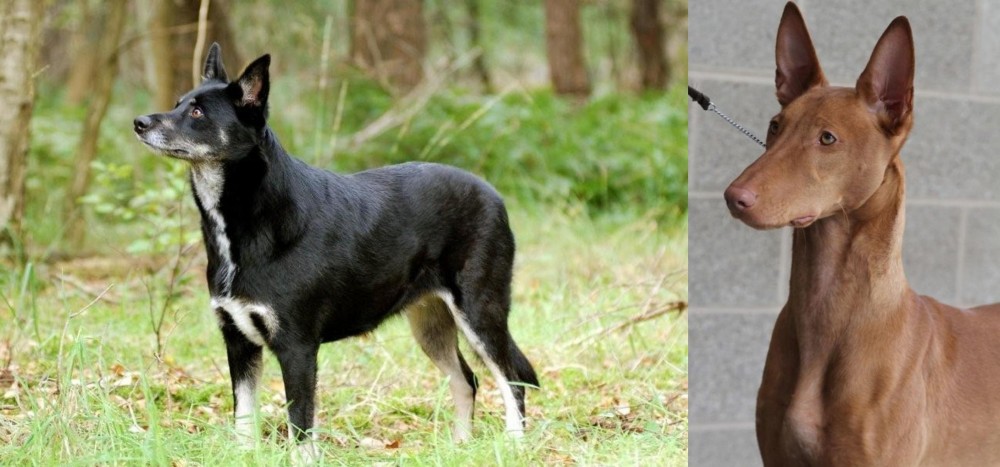 Lapponian Herder is originated from Finland but Pharaoh Hound is originated from Malta. Lapponian Herder may grow 12 cm / 4 inches shorter than Pharaoh Hound. Lapponian Herder may weigh 8 kg / 18 pounds more than Pharaoh Hound. Both Lapponian Herder and Pharaoh Hound has same life span. Both Lapponian Herder and Pharaoh Hound has same litter size. Lapponian Herder requires Moderate Maintenance. But Pharaoh Hound requires Low Maintenance
Lapponian Herder is originated from Finland but Pharaoh Hound is originated from Malta. Lapponian Herder may grow 12 cm / 4 inches shorter than Pharaoh Hound. Lapponian Herder may weigh 8 kg / 18 pounds more than Pharaoh Hound. Both Lapponian Herder and Pharaoh Hound has same life span. Both Lapponian Herder and Pharaoh Hound has same litter size. Lapponian Herder requires Moderate Maintenance. But Pharaoh Hound requires Low Maintenance
 The Lapponian Herder hails from Finland. He is a dog which was developed for the Sami people who needed a strong dog to herd and guard their reindeer. The Sami people knew that they could reply on these Spitz-type dogs to efficiently manage their reindeer herds.
The Lapponian Herder hails from Finland. He is a dog which was developed for the Sami people who needed a strong dog to herd and guard their reindeer. The Sami people knew that they could reply on these Spitz-type dogs to efficiently manage their reindeer herds.
As with many other dog breeds, their numbers dwindled during and after the Second World War, and breeders then stepped forward to restore the herding dog populations. The dog was developed from Spitz-type herding breeds which were crossed with black and white Karelian Bear Dogs as well as other dog varieties.
Both the Lapponian Herder and the Finnish Lapphund were recognized as the same breed, with the Lapponian being separated into its own breed in 1966.
The dog is one of Finland’s five national dog breeds and in 2017, the Lapponian Herder was accepted to the Foundation Stock Service program.
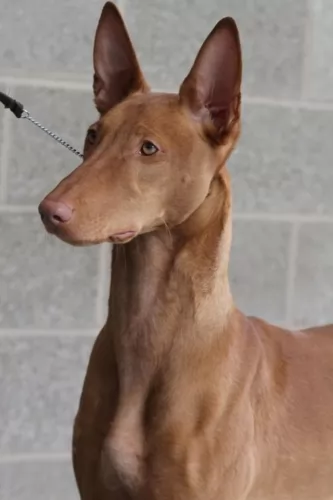 The Pharaoh Hound hails from Malta and is the national dog there. These dogs are rare and are looked upon as endangered. Because they are a primitive type dog, they enjoy good health.
The Pharaoh Hound hails from Malta and is the national dog there. These dogs are rare and are looked upon as endangered. Because they are a primitive type dog, they enjoy good health.
It has always been used as a hunting dog for rabbits. The dog has been recreated from mixing a combination of other breeds. It certainly seems to be an ancient dog breed, having existed for more than 2 000 years.
It is thought that the dog was imported to Malta by Phoenician traders. The dog has been classified as a member of the sighthound group, and arrived in England in the 1930s and to the USA in 1967. The breed was also officially recognized by the American Kennel Club in 1984.
 This is a medium sized dog and both male and female dogs stand between 43 and 51cm in height and weigh in the region of 30 to 35kg.
This is a medium sized dog and both male and female dogs stand between 43 and 51cm in height and weigh in the region of 30 to 35kg.
They have a medium length double coat which is straight and fairly harsh to the touch. They are moderate shedders.
Looking much like a combination German Shepherd and Wolf, the Lapponian Herder’s coat can be dark grey, cream, dark brown and black. He has erect ears, brown eyes and a long bushy tail which can be held low but which he raises somewhat over the back when he is alert. The head is wedge-shaped with tapering muzzle and black nose.
Energetic and lively while also being calm, the Lapponian Herder makes an excellent family pet.
As a very active breed, he is going to need an active, outdoor-type of owner. He is an intelligent, independent dog who wants to be kept busy. Because of his smartness he is easy to train ad socialize, being a dog that wants to please.
Training and socialization will do wonders for him, particularly because he is a vocal dog, loving to bark and air his views. With the training you can call out to him ‘be quiet’ and he will, as he becomes an obedient dog who is a pleasure to have around in all kinds of situations.
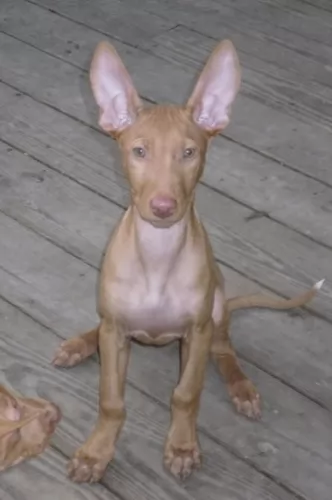 The Pharoah Hound is an elegant looking dog standing at roughly between 53 and 63cm and weighing 18 to 27kg.
The Pharoah Hound is an elegant looking dog standing at roughly between 53 and 63cm and weighing 18 to 27kg.
They are sleek dogs without any bulkiness about them and the coat is tight fitting with short smooth hair. The coat is a tan or red color, the eyes bright and the color of amber. The ears are fairly large and erect and the long tail slim with sometimes a white tip. The skin can be thin so the dog can be sensitive to the cold.
The neck of the dog is long and lean, as are the legs. An interesting aspect with this dog is that when the dog becomes excited its ears and nose become bright pink.
Pharoah Hounds are calm dogs and they can live in the city or in the countryside. They love kids and will be a wonderful playmate for them. Once he has had a lot of exercise and play, he is the kind of dog that will settle down happily with his human family for some quiet time.
Just as with any other dog, he will require training and socialization to make him obedient and better behaved.
 The Lapponian Herder is a great family pet who is social and who loves being in the company of his human family, being able to get on well with children in the home too, as well as pets.
The Lapponian Herder is a great family pet who is social and who loves being in the company of his human family, being able to get on well with children in the home too, as well as pets.
He plays a protective role too, not being quiet when it comes to barking and warning his family of intruders.
They’re very energetic dogs but can be docile indoors. He is smart too, being able to learn quickly. Bring one of these Lapponian Herders into your home, and you’re guaranteed a splendid family pet.
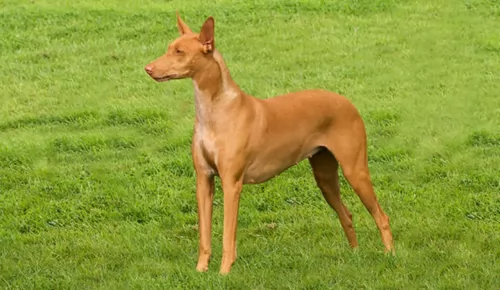 The Pharaoh Hound is quite interesting in a number of ways and he is independent, strong-willed and able to entertain and amuse himself.
The Pharaoh Hound is quite interesting in a number of ways and he is independent, strong-willed and able to entertain and amuse himself.
He loves to join in with the children and be part of their games. He’s intelligent and easily trained and he is also low maintenance.
While he’s not the most attractive dog to many people, others look at him as a true beauty. Whatever your opinion is, he will still make you a good family friend.
 The Lapponian Herder, with good care, should be able to live for 10 to 14 years.
The Lapponian Herder, with good care, should be able to live for 10 to 14 years.
He is generally believed to be a healthy dog breed, but as with most other dogs, there are a few health issues which can crop up. These can be eye- and infections as well as skin allergies. These can be highly irritating for your dog and painful too, and veterinary intervention may be required.
Other serious dog problems can be bloat and joint dysplasia.
 Pharaoh Hounds are uncommon outside of the Maltese Islands and with very little irresponsible breeding, these dogs are virtually free of genetic diseases. A common dog illness to look out for includes -
Pharaoh Hounds are uncommon outside of the Maltese Islands and with very little irresponsible breeding, these dogs are virtually free of genetic diseases. A common dog illness to look out for includes -
Your Pharaoh Hound can suffer from patella luxation, and in more severe cases it can be painful and even be disabling for a dog. This ailment comes about when the kneecap is dislocated from its normal position. You’ll find your dog lifting his hind leg quite a bit. Unfortunately this problem can lead to arthritis developing.
Other illnesses to look out for are bloat, cancer, skin allergies and ear infections.
 The Lapponian Herder has a dense coat and he is considered to be an average shedder with some seasonal shedding.
The Lapponian Herder has a dense coat and he is considered to be an average shedder with some seasonal shedding.
To keep the coat sleek and shiny, get into the habit of brushing him twice a week. With the assistance of the right grooming tools you will be able to clip his nails if he doesn’t wear them down naturally. Just be careful though, because cutting to far down can mean cutting him where the nerves are and this can cause your pet great pain.
When you brush him, check his ears at the same time and use a damp cloth to wipe away the excess wax and dirt.
His teeth should also be cleaned with canine toothpaste and toothbrush. If you are apprehensive about keeping up with these grooming procedures, there are professional dog grooming experts who will attend to your dog’s grooming needs.
The Lapponian Herder is a medium sized dog full of energy.
If you feed him commercially manufactured kibble, you’ll read on the packaging about the type of food it is and what portion sizes to give him. Always go for the top quality brands that are made with good meaty ingredients and not filled with the likes of colorants and preservatives.
It is healthier to give him 2 smaller meals a day as opposed to one large meal. Try and give him some home-cooked food to bring in some variety. Excellent food for him would be some cooked chicken, brown rice, pasta and some cooked or raw vegetables added into his kibble. Every now and then it can be good for him to have a bit of raw meat added into his food.
Your Lapponian Herder must have constant access to cool, fresh water. Remember to wash the bowl out regularly, as the dog’s saliva enters the water when drinking.
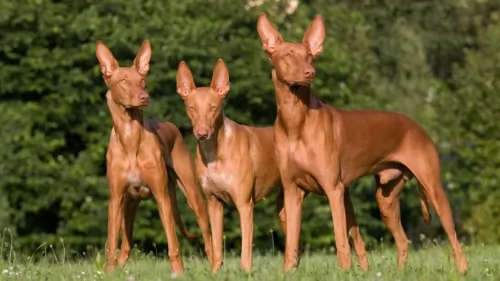 The Pharaoh Hound’s short coat is easy to groom and it will require a brushing at least twice a week just to get rid of loose hairs.
The Pharaoh Hound’s short coat is easy to groom and it will require a brushing at least twice a week just to get rid of loose hairs.
At the same time trim his nails, check inside his ears for infection and look inside his mouth for any rotting teeth.
Your Pharaoh Hound is an active, energetic dog and he will need a good dose of exercise every day. Take him with you on your walks or allow him to join you with your hikes, jogging or cycling. At home involve him in some ball games.
How much any adult dog eats will depend on a number of factors such as size of dog, age and his activity levels.
You get some excellent dog kibble these days on the market but the idea is to choose one of the high quality ones which have minerals and vitamins in them. Home-made food is also good for your pet and this should be kept simple, consistent and nutritious.
Every now and then you can add in some boiled chicken, brown rice or pasta and sweet potato, carrots and spinach to the kibble. Some raw meat added in can also be of benefit to your dog’s health.
Stay away from spicy, exotic foods and keep your dog's food easy like suggested so as to avoid digestive problems